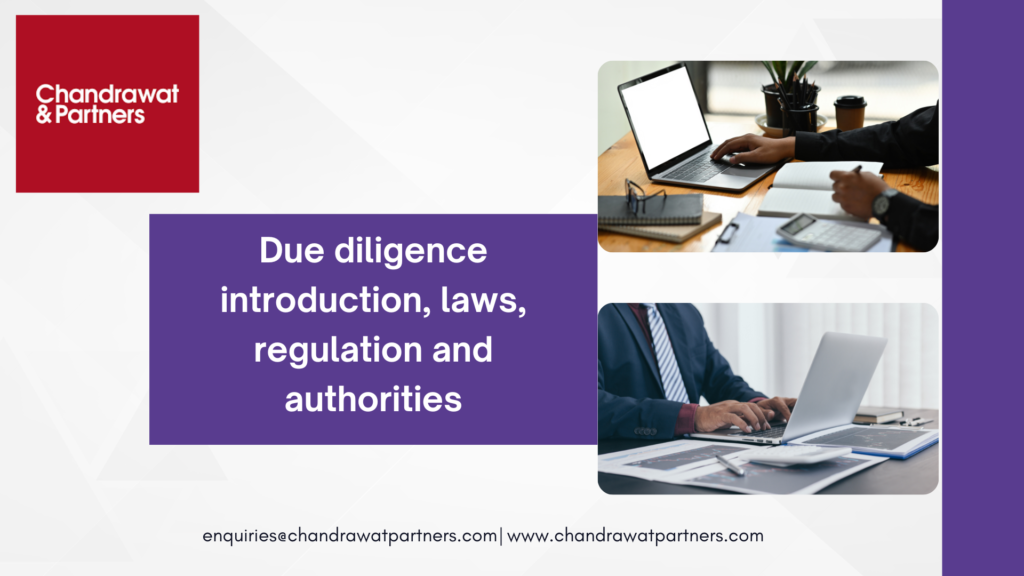Edit Content
Edit Content
Edit Content

Due Diligence Meaning: Due Diligence is a process that involves risk and compliance check, investigating, review, or audit to verify facts and information about a particular subject. In simple words, Due Diligence means doing your homework and acquisitions of required knowledge before entering into any agreement or contract with another company.
The due diligence audit enables companies to perform risk and compliance check to protect themselves by checking the assumptions and conditions of a mutual relationship or an offer and identifying relevant risks. What form of due diligence is appropriate depends on the specific situation, business transactions and the level of risk.
Due Diligence is an important business technique to consider before making any key business decisions or acquiring a company. Before you put your company finances into action, you need to understand its due diligence and how to do it correctly.
Enhanced due diligence involves collecting detailed information about individuals and companies to provide insurance. To ensure that this background research is thorough, companies need access to several different databases:
Company databases – Identification of possible links between companies and other involved persons.
Watch lists – Identification of individuals and companies, such as terrorism suspects, that are subject to state monitoring.
Sanctions lists – Identification of individuals and companies subject to economic or legal sanctions (embargos).
PEP lists – Identification of politically exposed persons who are close to a member of government or a member of a government agency and hence particularly vulnerable to corruption or bribery.
Press reports – Cross-checks with news reports to ensure that business partners are not linked to forms of economic crime such as corruption, money laundering, fraud or bribery.
On the basis of the results of the checks on new and existing business partners using these and other databases, companies may need to adjust the risk approach or terminate the initiation of a business relationship.
A due diligence check is needed for all companies and organizations if they engage in company mergers or acquire stakes, property, real estate, investment, investors or insurance transactions in other companies, or If they work with business partners, especially in an international context.
An ongoing due diligence is required for all your business partners, vendors, buyers & sellers to ensure compliance.
It is also a good idea to assess your target company, prospects before signing a sales contract to avoid issues in future.
Due diligence risk and compliance check tool helps companies protect their interests, for example in the context of M&A activities, to safeguard the value chain or comply with sanctions and with legislation on the prevention of money laundering, bribery and corruption. Due diligence and continuous market monitoring help companies in four ways:
Companies and organizations that are not internationally active are also subject to legislation such as the GWG.
Our professionals are trained to recognize, understand, and communicate the key value factors, threats, and opportunities that are most vital to our clients. Our extensive experience helps us to solve industry specific issues more effectively.
Our process is to determine the risk profile of an investment, and as a supplement for the management of the business, objectives, and evaluation criteria to be used.
Our due diligence team, based on review of the records, and meetings conducted with key persons, along with an in-depth analysis of data and information not only verify compliances and highlight potential risks and liabilities, but also provide key inputs for structuring your transaction. We also identify potential risks that need to be recorded by means of a representation, warranty, or indemnity.
Our due diligence team, based on review of the records, and meetings conducted with key persons, along with an in-depth analysis of data and information not only verify compliances and highlight potential risks and liabilities, but also provide key inputs for structuring your transaction. We also identify potential risks that need to be recorded by means of a representation, warranty, or indemnity.
Our due diligence reports are based on a wide range of industries, including the medical, automotive, chemicals and specialty materials, life sciences, power, and information technology. We assist clients in the implementation of the compliance management as well as assessing the risk of non-compliance and serve as important basis for collaboration with business parties. Our team tries to collect and analyse information before making a decision or conducting a transaction so that a party is not held legally liable for any loss or damage incurred.
For more information or queries, please email us at
[email protected]

Managing Partner
Copyright © Chandrawat & Partners. All Rights Reserved.
Copyright © Chandrawat & Partners. All Rights Reserved.

Chandrawat & Partners stands as a dynamic and rapidly expanding full-service firm, specializing in the delivery of exceptional professional and corporate services to a diverse clientele, both foreign and local. We proudly represent companies and individuals across a wide spectrum of sectors through distinct entities established in various countries worldwide.
ASIA
AFRICA
EUROPE
NORTH AMERICA
SOUTH AMERICA
OCEANIA
Chandrawat & Partners uses cookies to run our site and improve its usability.
By using our site you agree to our use of Cookies.